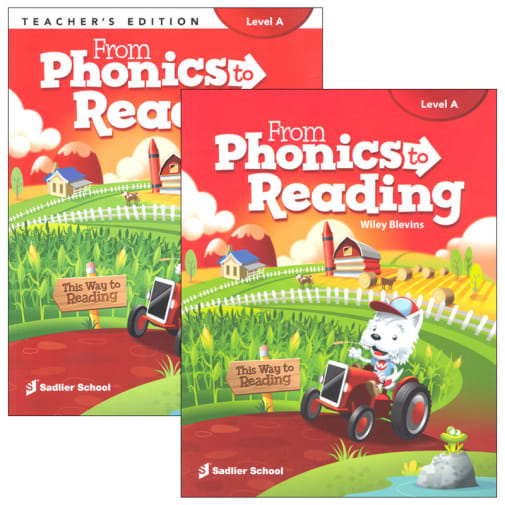From Phonics To Reading Set - Grade 1
Description
From Phonics to Reading is an attractive, well-organized, comprehensive, user-friendly program that bridges from solid phonics and reading instruction into language arts. The program is aligned to the Common Core State Standards and incorporates its terminology. But (and this is an important "but"), that aspect is not overwhelming and the teacher instructions are well designed and easy to follow. Identifying and incorporating seven characteristics of strong phonics instruction, the author's goal is to lay a very solid educational foundation. The characteristics? 1. Readiness Skills 2. Systematic Phonics Scope and Sequence 3. Blending 4. Dictation 5. Word Awareness 6. High-Frequency Words and 7. Reading Connected Text. Embedded review and repetition encourages mastery plus there is a focus on movement into real reading and writing rather than only isolated skill work. Components include a teacher guide and student workbook, sold separately or in a set.
The Teacher Edition is a gem. There's simply no other way to describe it. Day in, day out, the lesson plans are there to support you and provide exactly what you need when you need it. It's a wraparound book which means there are reduced copies of the student pages with all the teaching information you need provided "around the edges." This support material is extensive but even more importantly it is understandable. Each day provides simple steps with the amount of time needed for each. These steps repeat through the various days with a weekly pattern. Instructional words are provided (scripted) and activities are described in a straight-forward manner. Weekly lesson components include: phonemic awareness, sound-spelling/blending, high-frequency words, reading connected text, word sorts, dictation, word building, print concepts, word study, independent practice, cumulative review, writing extension, and cumulative assessment. Some of these are repeated daily; other concepts are incorporated on various days each week. Student answers are provided, as well as masters for any needed materials (such as letter or word cards, etc). Likewise, there are daily and/or weekly suggestions for independent/partner work, intervention, and home-school connection. Yes, these courses are geared to a classroom situation but the amazingly user-friendly teacher material means they are easily adapted for use at home.
There are 30 weekly lessons grouped into units. For most years, there are six units with five lessons each although there is a little variation in the 2nd and 3rd grades. Each unit targets a phonics grouping (for instance, long vowel letters and combinations.) For each unit, there is a planner and a pacing guide along with a progress check. Each unit starts with a "Dear Family" home connection page (available in a Spanish translation) that outlines the skills that will be covered in the unit and offers suggestions for extended learning at home. Then follows the daily lessons.
There are several things that separate these courses from other phonics programs. There is a parallel emphasis on word mastery and applied reading, with both aimed at building a solid literacy foundation. There is a minimum of "moving parts" which encourages do-ability. While many programs are colorful and inviting, few are as straight-forward and well-grounded.
Digital resources are provided by using the code found in the Teacher Guide. This provides teachers with instructional guides and professional learning videos by Wiley Blevins, interactive instructional resources, and digital resources available at SadlierConnect.com.
The colorful and engaging consumable Student Book is designed for ease of use. There are perforated pages and you will probably choose to distribute them one lesson at a time. Most lessons in the early grades include a removable "take-home" student reading book which is introduced in class and then sent home for repeated practice readings. This feature is clearly a classroom plan, but most homeschool students will be happy to take their new book "home." Other pages provide activities/exercises, handwriting practice, writing extensions, and a little thinking skills game called word ladders. The game has the student start at the bottom of the ladder with one word and go up the ladder following clues and changing one or more letters at each level into a new word. Word Sorts are another repeated activity. Starting with a list of words and four labeled boxes, the student distributes the words among the boxes under the proper label (such as "a_e," "short a," "i_e," and "short i").
You can boost your students' fluency and early reading skills with the Fluency Booster Practice Book, a supplement of the From Phonics to Reading program. This stand-alone resource provides a variety of practice for building fluency, vocabulary, and comprehension skills. Decodable readers are provided in Levels K-A. Partner reading provides opportunities for students to read short texts and are found in Levels B & C.
While we're still searching for a "perfect" phonics/reading program, this one moves really high up on my list. There's only one uncertainty about the program. There are references in the books to an online practice component. This must be under some sort of construction as I was unable to access it successfully. The good news is that anything online definitely seems to be in the "hmmm, this might be fun" category as opposed to something integral and necessary for the program. If this portion is never operational, you will not be missing anything essential to the goal of phonics and reading mastery. ~ Janice
| Product Format: | Product Bundle |
|---|---|
| Grade: | 1 |
| Brand: | Rainbow Resource Center |

